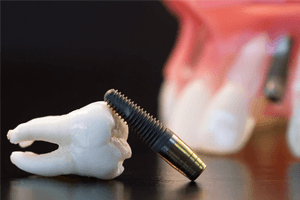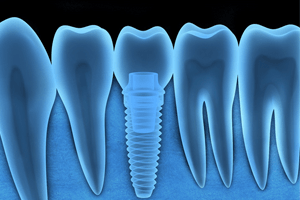
Dental Implantss – Belmont, NH
The Gold Standard in Tooth Replacement

Have you lost one or more teeth? Instead of putting up with the daily struggles of an incomplete set of teeth, talk to the team at The Center for Contemporary Dentistry about rebuilding your missing dentition. We will likely recommend that you receive dental implants in Belmont, NH. This remarkable treatment is the gold standard in tooth replacement because it rebuilds teeth from the roots up, and its results have the potential to last for decades.
Why Choose The Center for Contemporary Dentistry for Dental Implants?
- Start to finish implant treatment in one location
- In-house Oral Surgeon for your convenience
- Natural-looking, natural-feeling results
What Are Dental Implants?

A dental implant is the most efficient solution to replace a missing tooth. Instead of building up and replacing only top portion of the tooth, also known as the crown, a dental implant goes into the bone of the jaw. By using biocompatible materials such as titanium and porcelain, we can rebuild the missing tooth in its entirety. By replicating the tooth’s structure and integrating into the jaw, a dental implant can resolve most problems that tooth loss can bring.
The 4 Step Dental Implant Process

Many dental offices have to refer patients to an outside specialist for at least part of the dental implant procedure. At the Center for Contemporary Dentistry, however, we have the training and experience necessary to perform the entire treatment in-house, from the initial consultation to your implant placement surgery with our oral surgeon — and all the way to your final restorations. During every stage of the process, you can rely on us to provide you with compassionate, skilled care. Here is an overview of how dental implants work in Belmont for most patients:
Initial Dental Implant Consultation

Your initial consultation accomplishes several important purposes:
- Your dentist will learn about your circumstances to determine if dental implants in Belmont are a fit for you. We may take some X-Rays or CBCT scans of your mouth to gain a deeper understanding of your oral anatomy.
- You will discover whether you require any preliminary procedures, such as a bone graft or gum disease treatment, before you can get implants.
- You will have the opportunity to ask questions about your tooth replacement options.
- Our team will get started on planning the details of your dental implant treatment.
Dental Implant Surgery

While some practices in our area must refer patients to an outside specialist for implant placement surgery, our team has all the training necessary to accomplish this part of your treatment right here in our office. During your appointment, we will numb your mouth and may sedate you. Next, we will make incisions in your gums and carefully insert the implants at the proper place, angle, and depth. Once we close the incisions, you can go home to begin your recovery. Most patients are feeling well enough to return to work within a day or two of their procedure.
Dental Implant Osseointegration & Abutment Placement

Osseointegration is the biological process that allows the jawbone to form a strong bond with dental implants. It is what enables dental implants to provide such a sturdy base of support for the restorations that will go on top of them. Osseointegration usually takes at least several months.
Following osseointegration, you might undergo a second minor surgery, wherein your dental implants will be exposed and healing caps will be placed on them. After your gums recover, you may receive abutments, which are small connector pieces that will keep your restorations in place. (Some patients receive abutments during their initial implant surgery.)
Delivery of Dental Implant Restorations

To design your restorations, your implant dentist in Belmont will use images and impressions of your mouth. Our goal is to ensure that the size, shape, and color of your new teeth look as natural as possible and provides you with optimum function. After a laboratory fabricates your restorations, our team will verify their fit before we attach them to your implants. Once they are in place, we will check your bite and may give you some tips on how to adjust to them before we send you on your way so you can begin enjoying your new smile.
Benefits of Dental Implants

Dentists in the U.S. place over 5 million dental implants each year. Why is this treatment so popular? Really, the answer boils down to the many benefits that patients experience as a result of it. Dental implants in Belmont may improve your daily quality of life, support your overall health, and provide you with many years of strong smiles. Continue reading below to discover how this remarkable tooth replacement method might be able to change your life.
Day-to-Day Benefits

Some of the day-to-day benefits of dental implants in Belmont include:
- Natural function and feel. With implants, patients are rediscovering what it feels like to speak, laugh, and eat practically anything with comfort and confidence. No foods are off-limits. You should be able to enjoy even tough and chewy treats with ease.
- Outstanding aesthetics. The crowns, bridges, and dentures that we place on top of dental implants are virtually indistinguishable from natural teeth. We carefully design each restoration to complement a patient’s natural facial features and oral anatomy.
- Easy maintenance. In many ways, caring for dental implants is similar to caring for natural teeth. Depending on the type of restoration you have, you might just need to brush and floss to maintain a healthy, problem-free smile.
Health Benefits

Dental implants support oral and overall health in numerous ways:
- Bone preservation.In addition to restoring a natural appearance in the mouth, dental implants can help preserve the facial structure by preventing the bone deterioration that typically occurs when teeth are missing. You can thereby avoid the “sunken” look that often comes along with tooth loss. This is in contrast to traditional dentures, which might actually exacerbate bone loss.
- Protection for natural teeth. Dental implants do not usually require that any of the nearby teeth be modified or extracted. They also prevent nearby teeth from drifting out of place and causing a misaligned bite.
- A balanced diet. Because dental implants can enable you to eat anything, they can help you enjoy the disease-fighting benefits of a nutritious diet.
- Lower risk of gum sores. Because implant restorations are supported by the bone rather than the gums, you can expect your gum tissue to remain unbothered by them.
Long-Term Benefits

Your dental implants will begin to benefit you almost right away, and their advantages can continue with you for decades. Some of their long-term benefits include:
- With proper care, dental implants have the potential to last for decades — perhaps even an entire lifetime. The restorations on top of them are also durable enough to stand the test of time.
- Save money. Although dental implants cost more upfront than other forms of tooth replacement, their longevity makes them an excellent long-term value. Over the course of a few decades, they might even cost less than dentures.
- Save time. You will not have to worry about visiting your dentist for denture relines. Instead, you can just visit your implant dentist in Belmont twice a year for a standard cleaning and checkup.
Who Dental Implants Can Help

Dental implants in Belmont are a versatile treatment that can address any level of tooth loss. They may work for you whether you are missing one tooth, a few teeth, or entire arch of teeth. When you visit us for your consultation, we will examine your mouth and determine whether you are a good candidate for this treatment. Then, we will design your tooth replacement plan according to your unique needs.
Who Is a Good Candidate for Dental Implants?

In most cases, candidates for dental implants meet the following criteria:
- Fair overall health. You should be well enough to undergo minor surgery.
- Good oral health. It is important that you are free of gum disease and other oral health conditions that might adversely affect your implants.
- Adequate jawbone density. Your jawbone should be large enough and strong enough to integrate well with your dental implants.
Missing 1 Tooth

If you are missing just a single tooth, we will replace its root with a single dental implant. After the implant bonds with the bone around it over the course of a few months, we will permanently place a custom-made crown on top of it to replace the visible portion of the lost tooth.
A dental implant is superior to a traditional bridge in a few ways. For example, a traditional bridge requires that the abutment teeth be filed down, while a dental implant usually allows nearby teeth to remain intact. Plus, a dental implant supports the jawbone, but a bridge provides no bone health benefits.
Missing Multiple Teeth

If your missing teeth are in a row, we will likely recommend that you receive an implant-retained bridge. This type of restoration is similar to a traditional bridge, but instead of requiring support from the remaining natural teeth, it gains all of its strength from a few strategically placed dental implants.
If your missing teeth are not all adjacent to one another, you might need a few single-tooth implants throughout your mouth. Alternatively, we might be able to anchor a partial denture in place with a number of strategically placed prosthetic tooth roots.
Missing All Teeth

For patients who have lost all or most of their teeth throughout a dental arch, we often recommend implant dentures. The dentures may be permanently fixed in place, or they might simply “snap” onto and off of the implants with the help of small attachments. In some cases, a traditional denture can be retrofitted to work with dental implants, but most of the time, an entirely new prosthetic is necessary. Implant dentures are an extremely customized treatment, so we will be able to tell you more about the type that may be best for you when you attend your consultation.
Understanding the Cost of Dental Implants

The cost of dental implants varies from patient to patient and depends on a number of factors. When you visit us for your consultation (which will not cost you dime), we will provide you with an estimate for the price of each stage of your dental implant process. We will also help you explore payment options, including insurance and financing. Although dental implants cost more than traditional tooth replacement options, they are well worth it. Their stability, natural function and appearance, and longevity make them a smart investment for anyone who has suffered tooth loss.
Preliminary Treatments & Dental Implant Surgery

Some patients must undergo preliminary treatments, such as tooth extractions or gum disease therapy, before they qualify for dental implants in Belmont. Each of these procedures comes with its own cost. Your implant placement surgery comes with a separate fee, which will depend on how many implants we are placing and other factors. Because we are able to handle this procedure in-house, you will not have to worry about getting to know the pricing structure of an outside specialist.
The Parts of Your Dental Implant

There are quite a few different types of dental implant treatments, ranging from simple single-tooth replacement to full-mouth reconstruction. The nature of your procedure, the materials used to construct your dental implants, and the materials used to make your restoration will all have a bearing on your final cost. Companies that manufacture dental implants can charge a range of prices. If more than one type of dental implant or implant procedure might be right for you, we will clearly explain the cost associated with each of your options.
How Dental Implants Can Save You Money

While the cost of dental implants in Belmont might seem quite high at first, it is important to keep in mind that you are getting an excellent value. Dental implants last much longer than traditional forms of tooth replacement, so unlike with dentures and bridges, you might never have to worry about replacing them. The restorations on top of implants are also quite durable. Plus, the many health benefits of dental implants might spare you from having to pay for additional treatments down the road.
Does My Dental Insurance Cover Dental Implants?

Dental insurance policies vary greatly in their approach to dental implants. Some plans cover them, while others do not. Our team will be happy to help you figure out how your unique policy might apply; we have years of experience in dealing with insurance, and we are able to accept payment from the vast majority of PPO plans. Even if your policy does not cover the dental implants themselves, it might cover preliminary treatments or your final restoration.
Making Dental Implants Affordable

As your dental implant dentist in Belmont, we want to help you afford your new smile. That is why we offer:
- Financing. We are partnered with CareCredit, a third-party lender that offers low-interest payment plans for medical and dental services. The application process is easy, and most patients get approved for financing.
- A free initial consultation. You can learn more about dental implants and discover whether they are right for you — without paying anything out of pocket.
Dental Implant Technology

The education, skill, and experience of our dental team play a large role in helping patients rebuild strong and functional smiles with dental implants. However, we could not do what we do without the assistance of state-of-the-art technology. Our office features advanced instruments that can contribute to a safer, more efficient, more precise, and more enjoyable overall treatment experience. Would you like to learn more about the tools we use to replace missing teeth with dental implants? Here are a couple of examples:
CBCT Scanner

CBCT is an acronym for cone beam computed tomography. A CBCT scanner may also be referred to as a cone beam scanner or 3D CT scanner.
This remarkable piece of technology is used for imaging purposes. It uses the same type of radiation as a traditional digital X-ray. However, the radiation is emitted in a cone-shaped beam. This allows the machine to capture incredibly detailed, three-dimensional images of your teeth, jawbone, nerves, and connective tissues. It provides much more data than what we could capture with a routine X-ray.
A CBCT scan can serve a number of different purposes in dental implant treatment:
- It can help us determine whether your jawbone is strong enough to support dental implants.
- It familiarizes us with your oral anatomy so we can anticipate any complexities that might affect how and where we place your dental implants.
- After your implants are in place, a CBCT scan can allow us to monitor how well they are integrating with your jawbone.
- If you ever encounter a problem with your implants, a CBCT scan could help us to diagnose the nature of the issue and formulate an appropriate treatment plan.
The CBCT process is fast, noninvasive, and painless. Depending on which area of your mouth we are scanning, you could be finished with your scan in one minute or less.
Digital Impression System

After your dental implants are in place, it will be time for us to design your restoration — the crown, bridge, or denture that will get attached to your new prosthetic tooth roots. In the past, dentists always had to use manual impression techniques to get accurate data about how a restoration should be designed. Manual impressions can be uncomfortable, and sometimes, multiple attempts are necessary before a usable impression is captured.
Today, though, we can use digital impression technology. All we need to do is move a small, wand-like device around your mouth. It captures thousands of images of your oral structures before using advanced software to assemble them into a three-dimensional, digital representation of your mouth. The process is faster than manual impressions and rarely needs to be redone.
Using a digital impression and detailed notes from our team, a dental lab can create your beautiful new teeth with as much precision as possible.
Are you curious to learn more about dental implant technology and how we use it? Call our office to chat with one of our friendly team members!
Dental Implant Post-Op Instructions

After your dental implant surgery, you will have to go through a recovery period. But there is no need to worry. We will do everything we can to help you enjoy a smooth healing process. If you follow your dental implant post-op instructions in Belmont, you will lower your risk of complications and minimize your discomfort. Here are some tips to hep you while you are on the mend:
What to Do Directly After Dental Implant Surgery

Blood clots should form at your surgical sites. They are an important part of your body’s healing process, so you should do everything you can to protect them. Here are a few steps you can take toward that end:
- Do not spit. Use tissues or swallow excess saliva instead.
- Do not use drinking straws or smoke cigarettes. The suction action could dislodge the blood clothes. Cigarettes are particularly dangerous because of how they affect the body’s ability to heal.
- Do not touch your surgical sites. You should not touch your dental implant locations with either your tongue or fingers.
Common Side Effects

After you receive your dental implants in Belmont, you can expect to experience:
- Intermittent bleeding. You can manage this with gauze and light pressure. It should subside after several days.
- This can last for up to a week. Cold compresses may keep it to a minimum.
- General discomfort. Pain medication and rest can make you as comfortable as possible.
If you experience any strange or severe side effects, call your implant dentist in Belmont right away.
Diet

At first, you should adhere to a no-chew diet. This can include things like mashed potatoes, yogurt, ice cream, and smoothies. Once you feel comfortable, you can progress to fork-tender foods, like eggs, meatloaf, and soft breads. Depending on how many natural teeth you have left, you might be able to resume fairly normal eating habits after the soft tissue at your surgical sites heals. However, it would be wise to continue avoiding particularly tough foods until your implant restorations are in place.
Health & Oral Hygiene

The day after your surgery, you can brush your teeth as usual. However, you should be extra gentle near your surgical sites. Rinsing your mouth a few times each day with salt water can minimize swelling and fight bacterial buildup. If you have a prescription mouthwash, use it as directed. If you use a nonprescription mouthwash, try to avoid products with a high alcohol content.
What to Do After Your New Teeth Are Attached

Once your permanent new teeth are in place, you might experience some gum sensitivity and extra saliva production. These side effects usually go away fairly quickly. You should be able to use your crown bridge, or denture right away. No downtime or bleeding are to be expected. If you have questions about how to adapt to your prosthetic, you are welcome to call our team.
Maintaining & Caring for Your Dental Implants

Did you know that dental implants have the potential to last for decades? You can rightly look forward to many years of strong, healthy smiles after your new teeth are in place. However, it is vitally important that you practice proper dental implant care in Belmont along the way. Your diligence will minimize your risk of suffering from an infection or damage that could compromise your oral health and your dental implants. Here are some tips to help you out:
Make Oral Hygiene a Priority

Even though your dental implants in Belmont cannot get cavities, oral hygiene should remain a top priority. It can greatly reduce the risk that infection will lead to dental implant failure. Here are a few basic oral hygiene tips:
- Brush your teeth twice a day, making sure to clean along the gumline.
- Floss once a day.
- Drink plenty of water.
- Use a mouthwash if recommended by your dentist.
- If you have a removable implant-supported prosthetic, take it out of your mouth regularly for thorough cleanings.
Eat a Healthy Diet

You should feel free to eat all of your favorite foods with your dental implants. However, just like natural teeth, some foods are better for them than others. For example, overindulging in sugary or hard foods can increase the risk of plaque buildup and tooth damage. Try to eat a diet that is composed primarily of nutrient dense foods that support oral health, such as vegetables and dairy products.
Break Bad Habits

A few bad habits that can adversely affect dental implants include:
- If you smoke or chew tobacco, you are at a heightened risk of dental implant failure. Every effort you make to quit will be well worth it!
- Using your teeth as a tool. Using your teeth to open packages or trim your fingernails could damage your implant restorations.
- Chewing on hard objects. Biting down on ice or chewing on pen caps could harm your implant restorations.
Protect Your Dental Implants

If you often wake up with a sore jaw, you might grind your teeth at night. A nightguard can place a protective barrier between your upper and lower dental arches, reducing the risk that your teeth will harm one another. Similarly, if you play sports, you should wear a mouthguard to protect your dental implants and oral tissues from injury. Custom mouthguards from a dentist are more effective and more comfortable than over the counter ones.
Schedule Regular Dental Checkups

You should visit your implant dentist in Belmont at least twice a year for a cleaning and checkup. During these appointments, we will examine your dental implants, your gums, and your remaining natural teeth. If we notice any signs of developing problems, we may be able to address them before they become serious. We may also remove your implant restorations and clean your implant abutments to lower the risk of future infections.
Dental Implant Failure & Salvage

Dental implants are a consistently successful treatment — they thrive in more than 95% of cases! Unfortunately, though, they can fail due to things like infection, trauma, or certain medical conditions. If you ever believe that one of your implants is suffering, call us right away. We will evaluate the problem and recommend your next steps. Our goal is to get your oral health back on track as soon as possible and enable you to continue enjoying all the wonderful benefits of implant-supported tooth replacement.
Dental Implant FAQs
Our Belmont dental team would love to help you rebuild your smile with dental implants. Admittedly, though, this treatment requires a significant investment of both time and money. Before you commit to anything, you may want to learn more about the experience that awaits you. To prepare you for the road ahead, we have provided the answers to some FAQs about dental implants. If your specific questions are not included here, please give us a call — we are eager to speak with you!
How Long Do Dental Implants Last?
Dental implants have a long life expectancy. In fact, they often endure for 30 years or longer. In many cases, they even last throughout a patient’s lifetime! Their impressive longevity makes them an excellent value; they tend to last several times longer than traditional bridges and dentures.
Of course, for dental implants to last as long as possible, you should take good care of them. Thorough oral hygiene and other healthy habits are essential. Our team can give you pointers to help your implants stand the test of time.
Does Getting Dental Implants Hurt?
We always numb patients’ mouths before we place dental implants. You might feel some pressure during your procedure, but there should not be any real pain.
After the local anesthetic wears off, you can expect some soreness, swelling, and general discomfort. Usually, patients are feeling normal within a couple of weeks of their procedure. In the meantime, you may need to change some of your daily habits in order to minimize discomfort. For example, you might need to take pain relievers, get plenty of rest, and consume a modified diet. Cold compresses can reduce swelling and help to manage soreness.
Are Dental Implants Safe?
Dental implants are generally regarded as safe. They are made out of a titanium alloy that has a long track record of working well within the human body. The dental implant surgery is minimally invasive, and there is only a small risk of complications.
If there are any factors in your case that make dental implants a little risky, we will have a candid conversation with you about what you can expect from the procedure. We might also coach you on steps you can take to lower your risk level. For example, we may advise you to quit smoking or make other healthful lifestyle changes.
What Can Cause Dental Implants to Fail?
Dental implant failure is rare, but when it does happen, it is usually the result of an infection known as peri-implantitis. Peri-implantitis occurs when bacteria attack the tissue around an implant. It can cause so much damage that the implant loses its base of support. In many cases, poor oral hygiene contributes to the development of peri-implantitis.
Other factors, such as underlying medical conditions and injuries, can also play a role in dental implant failure.